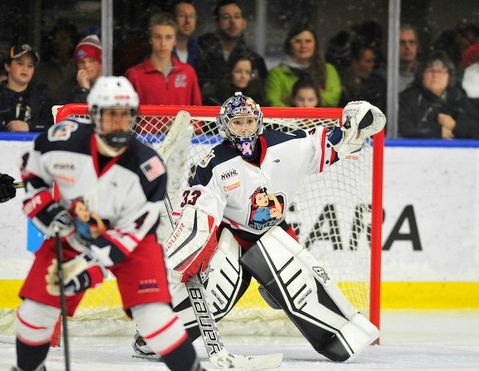Sapporo is the capital of Japan’s Hokkaido prefecture, and is famous for producing an eponymous beer that’s consumed at bars and izakayas across the world. It’s also been home to a famous annual snow festival since 1950, which is where one of the best hockey goalies in the world first fell in love with the game. She was six.
Nana Fujimoto joined the Japanese national team at age 16, represented her country at the 2014 Sochi Olympics, and was named Best Goaltender of the tournament at the 2015 IIHF Women’s World Championships after leading Japan to their first ever win over Sweden in a 4-3 shootout victory. Last summer, Nana decided to pack four bags and make the move to New York to join the Riveters, one of four teams in the newly-formed National Women’s Hockey League. For the first time in her career, Nana would earn a paycheck for playing hockey. It’s all happened pretty quickly, and Nana Fujimoto’s rise is not showing any signs of slowing.
Fujimoto’s father’s parents didn’t allow him to play hockey at a young age. Kenji Fujimoto would visit a rink near by his place, the Tsukisamu Gymnasium, but waited until he was 24 before he finally played. Kenji didn’t want his daughter to miss the same chance. He made sure to take her to the rink, even though swimming and gymnastics also appealed to Nana. Initially, Nana tried playing forward and in defense, and was only put in net because she was deemed not skilled enough at the other positions. When we met in New York earlier this winter, I asked if she enjoyed playing goalie right away. “Now I do,” she laughed, shaking her head.
We met at Clark’s Restaurant, a neighborhood diner in downtown Brooklyn, and were joined by Nori Matsuura, Nana’s translator. Nana worked slowly on her pasta, methodically setting aside pieces of chicken that she never gets around to finishing. One of the cultural shocks since moving to the city has been the food portions, she says. The other is the city’s grinding, delay-prone subways, which compare unfavorably to the efficient Shinkansen bullet trains back home. The small differences add up, but Nana is getting used to change.
When she joined the Japanese national team at 16, Nana found the balancing act of practicing and focusing on her school work a bit overwhelming. Training camps would sometimes be three, to four, hour drives away. To make it all work, Nana would study while she was away from the rink, and she proudly confirmed that she always finished first or second in her grade anyways. Her long-term plan never involved hockey, if only because such a plan would have been unrealistic at the time.
Nana knows why she was involved with the sport growing up: her father. “She might be a victim of my passion,” Kenji admits to me via an email exchange. Still, he never could have imagined her daughter would end up being Japan’s starting goalie. He couldn’t envision that Nana would end up walking away from the game, either.
When Nana obtained her graduate degree in psychology from Sapporo Gakuin University in 2009, she decided to quit playing hockey; her goal was to work as a psychotherapist at a hospital. “I had nothing to say,” Kenji said of his daughter’s decision. “I have no idea why she would give up the status she had gained [playing hockey]. I couldn’t understand why she would refuse a proposal to join the national team. But in my wife’s words: you were so selfish that you never listened to your daughter.”
In 2012, less than two years from the Winter Olympics in Sochi, Yuji Iizuka, the head coach of Japan’s women’s national hockey team, reached out to Nana about a comeback. She had some reservations, but Nana finally decided to postpone her summer vacation plans and join the team at training camp. She recognized a lot of familiar faces there, players she had grown up with; there was Iizuka, too, who Nana trusted all the way and made the squad into something like a family unit. She stayed.
Sochi represented a turning point in Nana’s appreciation of hockey. Until that tournament, she mostly played in small rinks, in front of crowds comprised of family and friends. The Olympics-sized crowd was something different, and she found it both a source of pride and inspiration. Even though Japan finished eighth in the tournament, Nana started to enjoy and even embrace the responsibility of being an ambassador of the game back home. As she attended other games and saw the increased level of competition, she realized that being a part of the medal ceremonies was something she wanted to accomplish with Japan. She was back.
After Sochi, Nana got back into playing hockey full-time. Before her move to New York, she was playing for Vortex Sapporo, a club team in Japan in the top tier of the Women’s Japan Ice Hockey League (Her 24-year-old younger sister Nachi is a defenseman on the team.). Nana decided to attend tryouts in New York last June, and she received an offer from Dani Rylan, the general manager of the Riveters (and commissioner of the league) after her first day. After considering for a few days, Nana signed the offer, returned to Japan, gave her employer notice, and was soon on her way back to the United States. Nana said her parents, with whom she still stays with when she’s in Japan, were supportive, although Kenji told me he was surprised and worried about his daughter’s move. “I assume she didn’t want to tell me until the last minute because she knew I was stubborn,” he said.
The Riveters play at the Aviator Sports & Events Center in Brooklyn. Nana lives out in Far Rockaway—way at the end of the A train, facing the Atlantic—with a few of her teammates. According to her social media feed, she’s fitting in just fine. Nana makes lemon tea bread before games, celebrated her first American Thanksgiving, and made her first trip to Shake Shack. The top players in the NWHL currently make $25,000 for the season, which means most players have full-time jobs. For Nana, the time away from games—the Riveters play just once a week, and sometimes have weeks off—is spent exploring the city and dealing with media obligations. Mostly, though, she spends her time at the practice rink.
Jonathan de Castro is the Riveters’ goalie coach. He’s played organized hockey since age seven, and was a huge Rangers fan growing up. As a smaller goalie, Jonathan, who is 5’8, grew up idolizing Dominik Hasek, Grant Fuhr, Andy Moog, and Mike Vernon. Jonathan was helping out with the NWHL’s public relations department when he offered to be the Riveters’ goalie coach one day. Rylan took him up on his offer.
The Riveters practice five times a week, and Nana and Jonathan spend much of that time working on adjusting to the NWHL’s smaller rinks. This is more confusing for a goalie than it sounds—playing in a different rink creates a change of pace in terms of where and when shots are directed at the net, and even though the differences can be measured in frames per second, it significantly reduces the decision time for goalies. Working on recognizing defensive coverages and framing pucks from the glove side have been areas of emphasis for Jonathan, who is plainly impressed with his student. He describes Nana as lightning quick and a phenomenally coordinated athlete, and has been wowed by her sense of humor and drive.
“Once she feels the difference in what I’m teaching her and it works, that’s when she gets more comfortable,” Jonathan told me. “She’s relentless. She wants to be on the ice. A lot of times I have to kick her off. She’s dedicated to being at the top of her game.” As of this writing, Nana has appeared in 10 games with the Riveters, compiling a 3-6 record with a .910 save percentage. There’s work to be done, but she’s doing it.
We were wrapping up our conversation at the diner when the topic of Nana’s future came up. She only signed a one-year contract, and Nana’s salary won’t work long-term if she’s going to stay in New York—another culture shock, which all New Yorkers can relate to, is how unsustainable things can feel, here. In Japan, there are no opportunities like what the Riveters have offered her. If she goes home, perhaps she can play with a club team, and use her graduate degree to find full-time work. But the young girl who once played to help realize her dad’s passion now wants more people in Japan to see what she’s done with her hockey career and perhaps follow her path. In fact, Nana doesn’t think in terms of years when I ask how long she plans on playing. “When I feel like I can’t improve anymore, I will quit,” she says.
The 2016 IIHF Women’s World Championships will take place in Kamloops, British Columbia in late March, and qualifying for the 2018 Winter Olympics will start next year. Nana is undecided whether her tenure with the Riveters will be more than a one-year experiment. In December, Nana travelled back to Nikko, Japan with the team for a three-game exhibition series, representing both her NWHL team and Team Japan. The league is growing—NWHL’s Boston and the CWHL’s Montreal teams took part in a game before the NHL’s annual Winter Classic on New Year’s Eve—but Nana’s ambitions are growing, too.
Jonathan hopes the league can become a long-term option for female professional hockey players to extend their careers and get paid—not just players like Nana, but like his daughter Rosalyn, who is 13 and has already been playing hockey for five years and can often be found hanging out at the rink while the Riveters practice. She and Nana have become friends over the course of the season. “By the time Rosalyn is a junior in college and she’s eligible for the draft, I want her to have this opportunity,” Jonathan says. “I believe the time has come for this recognition for a women’s league to exist. Hopefully down the stretch here we have a lot of really exciting playoff games.”
Kenji still works with several club teams in Japan to remain involved with the sport, although he hasn’t played for years. He’s a bit more pessimistic about the outlook of hockey in his home country. “If Japanese sports culture was more similar to the U.S., and considered as a business, ice hockey would be popular here,” Kenji says. “But there’s no hope for the sports industry here, especially for a sport as minor as hockey.”
For now, Nana is just happy to be playing the sport she’s finally learned to love. When I asked about her proudest accomplishment in hockey, she paused and then skipped past all of her achievements on the international stage, past Sochi Olympics, past recognition and respect from her peers. She skipped right ahead to the present, and smiled. “To be playing hockey right now,” she said.







